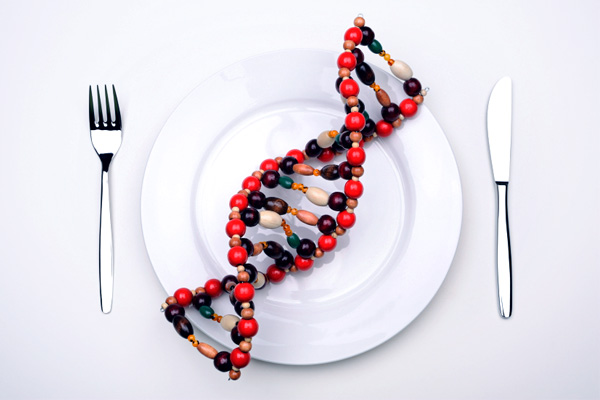Ever wonder why nutrition studies demonstrate so many conflicting results? It might be because of us. Well, because of our different genotypes, that is.
Just about everybody benefits from a diet composed mostly of whole foods, including lean protein and plenty of fresh vegetables. But when it comes to fine tuning for performance, weight loss, or optimum health, my needs and reactions to specific foods might differ quite a bit from yours.
And this difference likely depends, at least in part, on genetic variation.
Humans are 99.5% the same. Yet that 0.5% difference matters. After all, it accounts for 30 million letters in the genetic code. And within that 0.5%, you’ll find SNPs (single nucleotide polymorphisms – pronounced “snips”).
What are SNPs?”
When a single nucleotide in the genome is altered, that is a SNP. SNPs are the most common form of sequence variation in the human genome. More than 470 have been identified on the vitamin D receptor gene alone. SNPs determine our genetic differences – including our risk of particular illnesses.
Why test genetics?
Your skin color, body size, hair type, and predisposition to specific illnesses all depend on how your genes interact with your environment.
For instance, your genes may suggest that you’ll grow to somewhere between 5’5” and 5’8”. But your actual height is an interaction between genes and environment. If you grow up malnourished, you won’t ever reach 5’8.”
What we eat early in life (and what our moms eat while they’re pregnant) can affect our genes and regulate our traits – including the development of diseases, even decades later.
For example, data from the WWII Dutch Famine show that children of undernourished mothers had higher risk for cardiovascular disease, obesity, and breast cancer later in life.
(And in fact, this “famine memory” can persist for generations, “remembered” by descendants’ genes.)
Our genes can be influenced by all kinds of things, such as:
- nutrient deficiencies or excesses (especially at crucial developmental stages);
- dietary components (e.g., omega-3 fats, phytoestrogens, cruciferous vegetables, lycopene, folate, carotenoids, and so forth);
- sunlight and Vitamin D;
- toxins (such as industrial chemicals, pesticides, heavy metals, etc.);
- bacteria and viruses;
- exercise and activity;
- alcohol and other drugs;
- circadian rhythms (such as sleep, shift work, and travel across time zones); and
- a host of other factors we probably don’t even know about yet.
If that sounds a little scary, consider it from the opposite perspective: While we can’t control our genes themselves, we can affect their expression — whether they’re likely to get “switched on” or off.
Our genetic expression is strongly shaped by our environment… over which we do have some power. So, if we know more about our genetic variants, we might be able to adjust our lifestyle or environment in order to prevent some illnesses or become healthier.
For example, certain gene variants can tell us how food is metabolized. Others can tell us whether or not carcinogens in cooked meats will influence the development of colon and prostate cancers. And others can predict inflammatory response and efficiency of DNA repair/replication.
If we know more about our own unique risk factors, we might be more likely to make healthier choices — choices that could improve our genetic expression.
Take celiac disease. Some people can consume gluten (the protein composite found in many grains) without any problem. But when others eat gluten, it influences gene expression and sets off an inflammatory cascade in the gut.
Because gluten sensitivity symptoms are often somewhat vague, you might not know right away if you are gluten-intolerant. However, modern testing can reveal the gene variants that make certain people susceptible to celiac disease.
If you know your genetic makeup, and you know you carry the genes for gluten intolerance, it might help explain why you’ve been feeling ill… or might inspire you to change your diet before the inflammatory process becomes too advanced.

How genetic screening works
Genetic screening = testing + analysis.
Genetic testing can be performed via cheek swab, blood, or other tissue sampling. Any sample that contains human cell nuclei will work, since all cells have the same genes. DNA is extracted from the sample, then amplified, sequenced, and assembled into a readable format for the patient.
Researchers can then analyze single genes, arrays, or the full genome (see table). Once genetically screened, people can then receive their own tailored dietary prescription.
| Technology | Rare diseases | Common diseases | # of genes tested | Turn-around time | Approx. cost |
|---|---|---|---|---|---|
| Single-gene sequencing | Excellent | Poor | One | Weeks to months | $100s – $1000s |
| Arrays | Moderate | Excellent | Thousands | Hours to days | $100s or less |
| Full genome sequencing | Excellent | Excellent | All | Days to weeks | $1000s |
Source: Colby B. Outsmart your genes. Perigee; 2010 (48).
Note: If you have private health insurance, your insurer might reimburse you for genetic testing if a rare disease is discovered. However, most health insurance plans (whether private or public) don’t cover screening for most common diseases.
Also note: Most commercial genetic testing services only test part of the genome nowadays. Full sequencing is simply too expensive. It may cost upwards of $10,000 to test your entire genome.
Privacy & discrimination
Understandably, many people are concerned about what happens to their genetic information once they discover it.
- If you live in the U.S., you are protected by the Genetic Information Non-discrimination Act (GINA), which prevents health insurance companies and employers from discriminating based on your genetic information.
- General discrimination based on genetic features is prohibited in the EU member states. Specific legislation around how your genetic information is used and protected varies by jurisdiction.
- UNESCO (the United Nations Educational Scientific and Cultural Organization) states that the human genome “underlies the fundamental unity of all members of the human family, as well as the recognition of their inherent dignity and diversity. In a symbolic sense, it is the heritage of humanity.” Thus: “no one shall be subject to discrimination based on genetic characteristics that is intended to infringe or has the effect of infringing human rights, fundamental freedoms and human dignity”. This statement isn’t binding, but it does show a global scientific consensus that genetic information should not be used to harm or constrain us.
What can genetic screening tell you?
Genetic screening might be able to:
- Tell you how effective certain lifestyle interventions will be for you.
- Identify a rare disease.
- Show risk of future disease, such as arrhythmias, cancers, heart failure, Alzheimer’s, aneurysms and strokes, Type 2 diabetes, etc.
- Show current diseases: However, be aware that some associations between gene variants and diseases are based on older genetic mapping systems, so be prepared to do some research.
- Identify diseases that you carry but which don’t affect you: In other words, identify carrier status of recessive traits, such as hemophilia. Couples can use genetic screening to predict the potential diseases and traits of their offspring.
Along with shaping potential food choices, genetic screening may also be useful in exercise prescriptions. Specific genes have been identified with athletic performance and muscle size.
We’re also starting to learn about how genetic variants can shape possible behavior traits such as impulsive tendencies, antisocial behaviors, and violence.
Knowing, for instance, that you’re probably an easily distracted novelty-seeker who’s constantly looking for a reward can help you understand why you might be more drawn to a “hit” such as an exciting sport or a tasty snack. And it might help you work with your nutrition coach to find nutritional, exercise, and behavioral strategies that work for you.
(You do have a nutrition coach, right? Oh, you don’t? Well, why not get yourself over to our Lean Eating or Scrawny to Brawny coaching programs, or check out one of our PN-certified trainers, and find one!)
What genetic screening can’t tell you
As valuable as genetic screening can be in specific situations, current methods can’t tell us as much as we might like.
That’s because knowing our DNA sequence alone isn’t enough. The human genome is complex and repetitive, and SNPs are not the only source of genetic variation.
And while some genetic variants certainly contribute to a given illness, you can get sick from that illness even if you don’t have a known genetic predisposition.
For example, while we know about two gene variants (BRCA1 and BRCA2) that contribute to breast cancer, most breast cancer patients don’t have those gene variants — only about 5-10% of breast cancer patients actually have those two variants.
At this point, we simply haven’t identified all possible gene variants. So having Gene Variant X isn’t necessarily a prison sentence, nor is Gene Variant Y a “get out of jail free” card.
What would you do?
While genetic screening can give us some useful information, it can’t predict how we’ll feel about the results.
Having access to knowledge about our genotype brings a new level of self-responsibility. It’s hard to predict how we’ll act when given potentially life-changing information.

Summary and recommendations
Genetic screening may show us the way to individualized nutrition and exercise prescriptions. But we’re not quite there yet.
Here’s what we know right now.
One size doesn’t fit all.
Genetic subgroups might respond differently to different foods and activity types. In theory, genetic screening might help us customize food (and supplement) intake and exercise prescriptions for each person’s unique needs.
The details are kinda hazy.
In practice, it’s not as clear how genetic diversity might play out or how much it even matters. After all, we also choose food and exercise based on other things like taste, convenience, price, and cultural norms.
Gene expression isn’t a destiny, it’s a set of possibilities.
What if your genes show you’re all slow-twitch endurance athlete but your behavioral tendencies prefer the excitement of fast-twitch sprint events? How closely should you stick to your “blueprint”? How much can you affect your genetic expression through environment and habitual choices?
We don’t have all the answers yet.
Measuring nutrient-gene interactions takes time and effort. Genetic mapping is complicated, sometimes expensive, and error-prone. And for any of this to matter, a genetic variation must be linked to a precise biological course of action.
Genetic testing is interesting. Provocative. Complex. And let’s be honest, kinda cool.
But for now, it raises more questions than it answers.
Stay tuned.
When genetic screening companies are able to more cost-effectively test the entire genome (again, most only test a part of it) we should have a greater understanding of gene sequencing and its use in nutrition. Most experts predict that’ll happen within 2-3 years, as the cost of sequencing the entire genome drops from $10,000 to $500.
If you think you’re at risk for a known genetically-based sensitivity such as celiac disease, it might make sense to find out. But if you are hoping for 100% accuracy that will predict your future health and give you a perfectly individualized prescription diet, you might want to hold off until then.

Resources
For a list of specific interactions between nutrients and genes, see here:
German JB, et al. Nutrigenomics and personalized diets: what will they mean for food? Annu Rev Food Sci Technol 2011;2:97-123.
Costa V, et al. Nutritional genomics era: opportunities toward a genome-tailored nutritional regimen. J of Nutritional Biochemistry 2010;21:457-467.
Genetic screening options:
Note: most of our lab rats here at Precision Nutrition had genetic screening done by one or both of the companies above for under $500. Sample collection can be done at home and is extremely simple. The reporting processes of both companies are very professional. And we did learn a lot of interesting things about ourselves.
References
Click here to view the information sources referenced in this article.
Learn more
Want to get in the best shape of your life, and stay that way for good? Check out the following 5-day body transformation courses.
The best part? They're totally free.
To check out the free courses, just click one of the links below.



Share